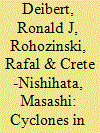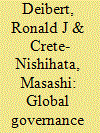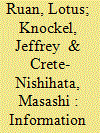|
|
|
Sort Order |
|
|
|
Items / Page
|
|
|
|
|
|
|
| Srl | Item |
| 1 |
ID:
110833


|
|
|
|
|
| Publication |
2012.
|
| Summary/Abstract |
While the rhetoric of cyber war is often exaggerated, there have been recent cases of international conflict in which cyberspace has played a prominent role. In this article, we analyze the impact of cyberspace in the conflict between Russia and Georgia over the disputed territory of South Ossetia in August 2008. We examine the role of strategic communications, information operations, operations in and through cyberspace, and conventional combat to account for the political and military outcomes of the conflict. The August 2008 conflict reveals some emergent issues in cyber warfare that can be generalized for further comparative research: the importance of control over the physical infrastructure of cyberspace, the strategic and tactical importance of information denial, the emergence of cyber-privateering, the unavoidable internationalization of cyber conflicts, and the tendency towards magnifying unanticipated outcomes in cyber conflicts - a phenomenon we call 'cyclones in cyberspace'.
|
|
|
|
|
|
|
|
|
|
|
|
|
|
|
|
| 2 |
ID:
114221


|
|
|
|
|
| Publication |
2012.
|
| Summary/Abstract |
States are moving to assert their interests more forcefully in cyberspace and associated governance regimes. Traditionally, transnational networks of engineers, based primarily in the United States and Europe, have been the primary architects of cyberspace governance, with the users and private sector shaping cyberspace itself. However, governments are becoming increasingly influential across a number of governance forums and are deliberating on how to exercise power in and through cyberspace. Particularly noteworthy are how nondemocratic states outside of Europe, North America, and parts of Asia have begun to forcefully assert their interests in cyberspace governance regimes, including some, like the International Telecommunications Union, that were previously marginalized in the Internet space. Western liberal democracies are also moving away from laissez-faire and market-oriented approaches to more state-directed controls and regulations. Drawing from international relations theory literature, and in particular constructivist approaches, this article examines international and global mechanisms and dynamics that explain the growth and spread of cyberspace controls. It also provides a study of "norm regression" in global governance: the growth and spread of practices that undercut cyberspace as an open commons of information and communication.
|
|
|
|
|
|
|
|
|
|
|
|
|
|
|
|
| 3 |
ID:
179772


|
|
|
|
|
| Summary/Abstract |
When does repression of online expression lead to public punishment of citizens in China? Chinese social media is heavily censored through a system of intermediary liability in which the government relies on private companies to implement content controls. Outside of this system the Chinese authorities at times utilize public punishment to repress social media users. Under China’s regulatory environment, individuals are subject to punishment such as fines and detention for their expressions online. While censorship has become more implicit, authorities have periodically announced cases of repression to the public. To understand when the state escalates from censoring online content to punishing social media users for their online expressions and publicizes the punishment, we collected 468 cases of state repression announced by the authorities between 1 January 2014 and 1 April 2019. We find that the Chinese authorities most frequently publicize persecutions of citizens who posted online expression deemed critical of the government or those that challenged government credibility. These cases show more evidence of the state pushing the responsibility of ‘self-regulation’ further to average citizens. By making an example of individuals who post prohibited content even in semi-public social media venues, the state signals strength and its determination to maintain authority.
|
|
|
|
|
|
|
|
|
|
|
|
|
|
|
|
|
|
|
|
|